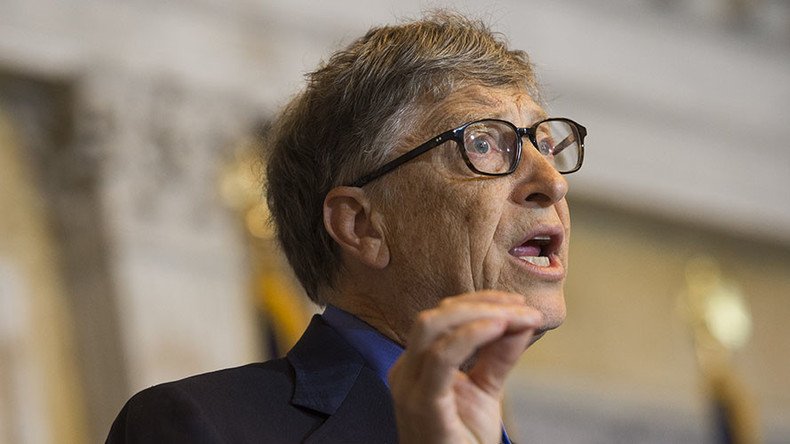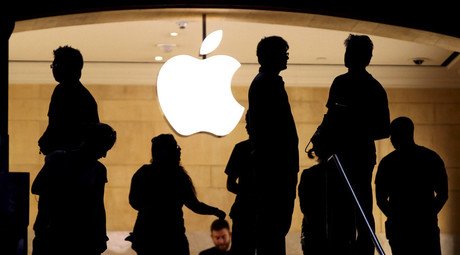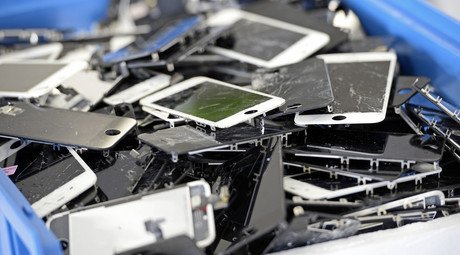Bill Gates supports FBI access to San Bernardino iPhone for ‘this specific case’

Microsoft founder Bill Gates supports both sides of the debate between the FBI and Apple over unlocking the iPhone at the heart of the San Bernardino shooting case ‒ but only in this “specific case,” he says. And that puts him at odds with Silicon Valley.
At issue is the work cellphone of Syed Rizwan Farook ‒ who, along with his wife, carried out the December terrorist attack in California. The FBI ‒ supported by a judge’s ruling ‒ and the Department of Justice want Apple to help it hack into the phone. The tech company insists that this will “unprecedented step which threatens the security of our customers,” as CEO Tim Cook wrote in an open letter.
The debate has exploded into the public sphere, with the giants of Silicon Valley squaring off against the federal law enforcement agency. On Tuesday, Gates became the latest big name in tech to weigh in on the issue.
“This is a specific case where the government is asking for access to information. They are not asking for some general thing, they are asking for a particular case,” Gates told the Financial Times.
“It is no different than [the question of] should anybody ever have been able to tell the phone company to get information, should anybody be able to get at bank records,” he continued. “Let’s say the bank had tied a ribbon round the disk drive and said, ‘Don’t make me cut this ribbon because you’ll make me cut it many times’.”
In publishing the interview, the Financial Times trumpeted that Gates “backs FBI iPhone hack request.”
His stance separates him from the rest of the technology industry, the paper noted, including from Microsoft’s viewpoint on the issue. The Seattle-based software company joined the fight as part of the Reform Government Surveillance coalition, a group of IT heavyweights – including Facebook, Yahoo, Dropbox and LinkedIn – calling for changes in “the practices and laws regulating government surveillance of individuals and access to their information.”
Apple says San Bernardino iPhone password changed within 24 hours of government custody https://t.co/kQPXueKoAvpic.twitter.com/s5PJrG2Xn8
— RT (@RT_com) February 20, 2016
Gates clarified his position later Tuesday morning, saying he was “disappointed” in how his position had been reported by the Financial Times.
“That doesn’t state my view on this,” he said on ‘Bloomberg Go’. “The extreme view that government always gets everything, nobody supports that. Having the government be blind, people don’t support that.”
Gates sees the need to not only strike a balance between the government’s needs and those of Apple and of Americans, but also a need for a discussion of that balance to occur in the public sphere.
“You don’t just want to take the minute after a terrorist event and swing that direction, nor do you want to completely swing away from government access when you have some abuse,” he said. “You want to strike that balance that the United States leads and setting an example.”
Apple, through Cook, has accused the FBI of asking the company to set "a dangerous precedent that threatens everyone’s civil liberties" by creating an encryption “backdoor” that would allow not just law enforcement to hack its iPhones, but others with more nefarious intents.
For its part, the FBI denies wanting to “set a master key loose on the land,” Director James Comey wrote in a statement on Sunday that concentrated on the victims of the attack, saying: “we can’t look the survivors in the eye, or ourselves in the mirror, if we don’t follow this lead.”
Most of Silicon Valley has come down squarely on Apple’s side of the debate.
“I don’t think building back doors is the way to go, so we’re pretty sympathetic to Tim [Cook, CEO] and Apple,” Facebook CEO Mark Zuckerberg told an audience at the World Mobile Congress in Barcelona, Spain on Monday.
Google GEO Sundar Pichai showed his support for his competitor in a series of tweets last Wednesday.
“We build secure products to keep your information safe and we give law enforcement access to data based on valid legal orders,” Pichai tweeted. “But that’s wholly different than requiring companies to enable hacking of customer devices & data. Could be a troubling precedent.”
Yet the public tends to side more with the FBI than with the tech industry: A little more than half of Americans (51 percent) say that Apple should help the FBI unlock the iPhone, as opposed to 38 percent who say it should not, according to a Pew Research Center survey released on Monday that queried 1,002 adults by phone.
Pew Research Survey Finds Majority Side with FBI Against Apple (Using Wrong Question) https://t.co/qOBiI5MF04pic.twitter.com/0i74qTOZ8r
— The Mac Observer (@MacObserver) February 23, 2016
Regardless of the outcome of “this specific case,” Gates hopes that the debate will lead to legal changes that are sufficient for both sides: That the government will be able to enforce taxation, stop crime and investigate terror threats, but that there will be laws outlining how and when that information can be accessed.















